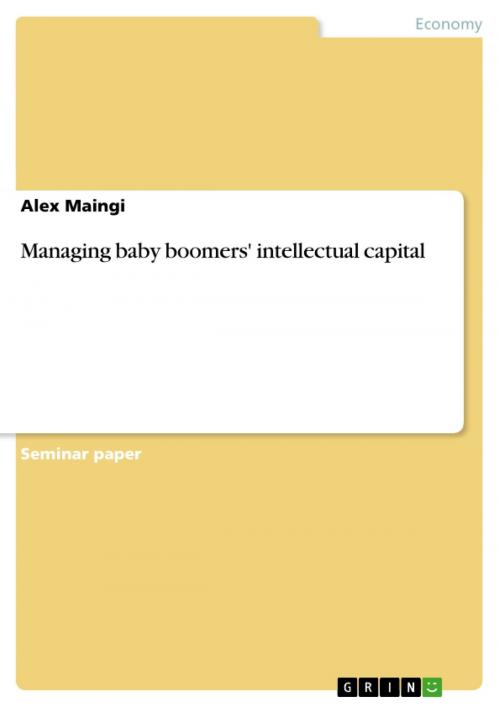| Author: | Alex Maingi | ISBN: | 9783656612353 |
| Publisher: | GRIN Verlag | Publication: | March 11, 2014 |
| Imprint: | GRIN Verlag | Language: | English |
| Author: | Alex Maingi |
| ISBN: | 9783656612353 |
| Publisher: | GRIN Verlag |
| Publication: | March 11, 2014 |
| Imprint: | GRIN Verlag |
| Language: | English |
Seminar paper from the year 2011 in the subject Business economics - Business Management, Corporate Governance, grade: A, University of Canberra, language: English, abstract: The human resource in America is remarkably changing. Throughout most of the last century, businesses and organizations could depend on a steady flow of potential employees with the required skills as well as career expectations that were required by the organizations. Nonetheless, this is no longer guaranteed. Presently, the technology, demographics, culture as well as new sourcing processes are making top managers to re-think hard their strategy regarding their workforce. As Welsh, Gordon, & Williams (2008) clearly observes, organizations hoping to attain and maintain high performance have to take a broad approach to comprehend this change, assess the effect and formulate a mix of solutions to possible manage this aspect. This challenging aspect is partly because of demographics. The stable flow of employees has been out of order. The available statistics are alarming: Every one hour, six baby boomers are retiring; indeed, according to Smith (2007) over 75 million of these baby boomers will be retired by 2011. The retirement rate will now be high than the inflow of talent/skilled workforce. With the high rate of retirement and low rates of birth rates in the United States, the present situation of the workplace environment is in doubt at best. The aim of this position paper is to examine opposing view on managing talent of baby boomers intellectual capital prior to their retirement.
Seminar paper from the year 2011 in the subject Business economics - Business Management, Corporate Governance, grade: A, University of Canberra, language: English, abstract: The human resource in America is remarkably changing. Throughout most of the last century, businesses and organizations could depend on a steady flow of potential employees with the required skills as well as career expectations that were required by the organizations. Nonetheless, this is no longer guaranteed. Presently, the technology, demographics, culture as well as new sourcing processes are making top managers to re-think hard their strategy regarding their workforce. As Welsh, Gordon, & Williams (2008) clearly observes, organizations hoping to attain and maintain high performance have to take a broad approach to comprehend this change, assess the effect and formulate a mix of solutions to possible manage this aspect. This challenging aspect is partly because of demographics. The stable flow of employees has been out of order. The available statistics are alarming: Every one hour, six baby boomers are retiring; indeed, according to Smith (2007) over 75 million of these baby boomers will be retired by 2011. The retirement rate will now be high than the inflow of talent/skilled workforce. With the high rate of retirement and low rates of birth rates in the United States, the present situation of the workplace environment is in doubt at best. The aim of this position paper is to examine opposing view on managing talent of baby boomers intellectual capital prior to their retirement.















